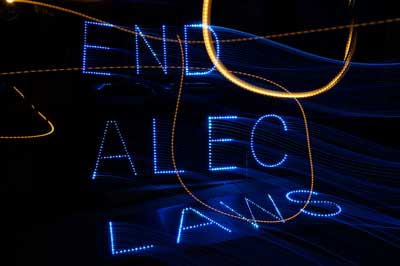
Exactly 54 days after Lisa B. Nelson started her job as the CEO of the American Legislative Exchange Council (ALEC), she got some bad news from a major supporter: The tech giant Google wanted out of its relationship with ALEC.
Google Executive Chairman Eric Schmidt said the relationship had been a “mistake.” Nelson fumed that Google’s abrupt “Dear John” note was like “breaking up via text with your girlfriend when you’re 16.”
So who or what is ALEC and why should anyone care about its relationships?
ALEC calls itself a nonpartisan organization that focuses on the principles of “limited government, free markets, federalism, and individual liberty.” Not quite.
Here’s a slightly more accurate description from The New York Times. It’s “a conservative-leaning group that has urged repeal of state renewable power standards and other pro-renewable policies.” ALEC has fought against efforts to address global warming all over the country.
After Schmidt left Nelson high and dry, she may have wanted to “unfriend” him on Facebook. But she couldn’t do that, because Facebook is breaking up with ALEC too. Maybe she could post a torn-up picture of her and Schmidt to Yahoo’s photo-sharing Flickr site? Nope, Yahoo’s also dumping ALEC.
How about leaving nasty comments about Google, Flickr, and Yahoo on the consumer review website Yelp? Sorry, Yelp already gave ALEC the thumbs down. And before she opens Outlook to send some “actually-I’m-the-one-who-broke-up-with-YOU” emails, she might recall that even Microsoft has pressed
What did ALEC do to scare off all its suitors? For starters, it tried to steal our democracy.
The “council” is a coalition of corporations like Koch Industries and ExxonMobil and corporate-friendly state legislators. The lawmakers pay nominal dues to bring their families on all-expenses-paid vacations, where they mingle with their corporate benefactors and receive “model” bills written by corporate lobbyists on a host of issues.
The rested and relaxed lawmakers then take these Stepford-wife bills home to their statehouses. Why not cut out the middleman and just let the corporations pass the laws themselves?
Technology firms may have hoped that ALEC could help them promote their own issues, such as an open Internet. But now they’re fleeing the group in droves.
What changed? The climate movement emerged.
Schmidt was blunt: ALEC is “literally lying” about the reality of climate change, he said. It’s “hurting our children and our grandchildren and making the world a much worse place.” I can see how that would be a problem for a company whose official corporate motto is still “Don’t be evil.”
The climate movement is making it harder than ever for corporations to get away with poisoning our future. And it’s not just tech companies seeing the light.
In late September, Occidental Petroleum — yes, an oil company — announced it was leaving ALEC over the council’s opposition to environmental regulations. Other companies that have severed ties with ALEC include Amazon, General Electric, Apple, Coca-Cola, General Motors, Bank of America, and Procter & Gamble. Many of these companies left after Color of Change and other grassroots organizations called out ALEC for its support of voter-suppression and “stand your ground” laws around the country.
Unfortunately, plenty of corporations are still palling around with ALEC. Perhaps Lisa Nelson shouldn’t have been so quick to toss all her Google swag in the trash when the tech giant broke her heart — she could have sold it on eBay.
That’s right: eBay is still supporting an organization that Apple, Amazon, Google, Microsoft, Yelp, Yahoo, and Facebook have all unfriended. It’s time for eBay and the rest of the corporations that haven’t yet done so to dump ALEC too.